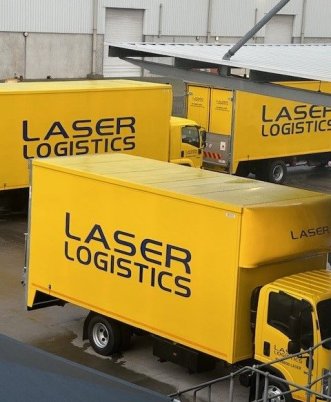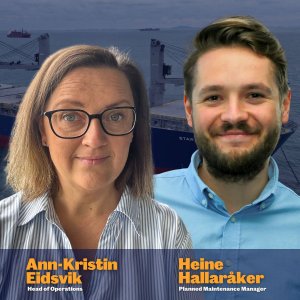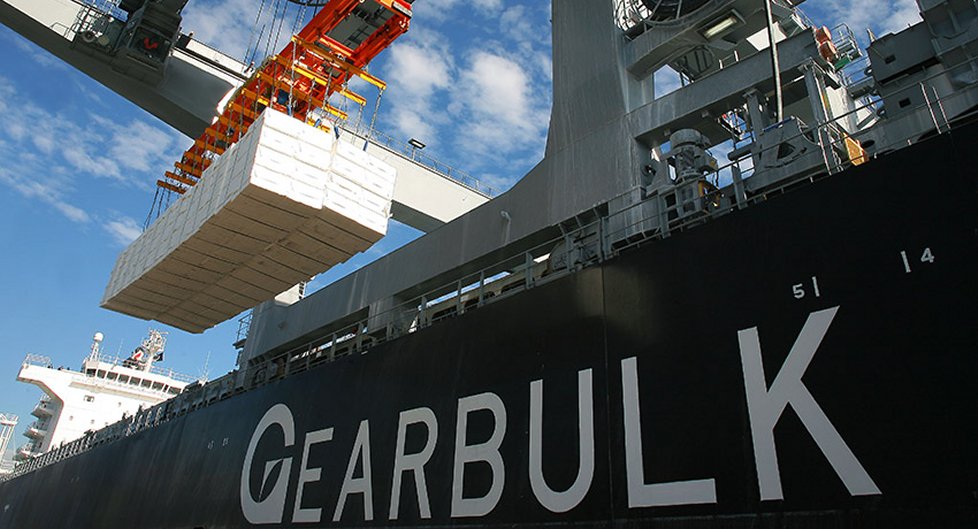|
|
UPM Communication Papers Renews Shipping Agreement with Spliethoff
 Sept. 17, 2025 - UPM Communication Papers is expanding its logistics presence in the United States through a renewed shipping partnership and new port operations. On January 1, 2026, UPM will renew its long-term freight agreement with Dutch shipping company Spliethoff, maintaining regular shipments from Europe to Jacksonville, Florida. Sept. 17, 2025 - UPM Communication Papers is expanding its logistics presence in the United States through a renewed shipping partnership and new port operations. On January 1, 2026, UPM will renew its long-term freight agreement with Dutch shipping company Spliethoff, maintaining regular shipments from Europe to Jacksonville, Florida.
For over 25 years, Spliethoff has reliably transported a broad range of UPM business area offerings — including products from UPM Communication Papers, Specialty Papers, Plywood, and Fibres — from Europe to global markets.
In addition, a new port contract with Enstructure, a valued partner at the Talleyrand Marine Terminal in Jacksonville, and will now extend its services to Port Wilmington, Delaware. The contract becomes effective this Fall.
"These agreements reflect our strong commitment to the North American market and reinforce our promise to deliver reliable and efficient service to our customers across the region," said Gunnar Eberhardt, Executive Vice President, UPM Communication Papers.
About Enstructure
Enstructure is a leading U.S.-based logistics and infrastructure company specializing in marine terminals and integrated supply chain solutions. With a strong presence across key ports, Enstructure provides tailored services for bulk, breakbulk, and project cargo.
UPM Communication Papers offers a wide portfolio of papers for newspaper, magazine, marketing and book printing as well as for home and office applications. The division employs around 5,000 people and operates 10 modern paper mills globally. Its annual production capacity is 4.3 million tonnes of graphical paper.
SOURCE: UPM Communication Papers |
|
Fr. Meyer's Sohn Acquires South African Freight Forwarder GAC Laser
 Aug. 5, 2025 - Fr. Meyer’s Sohn (FMS) has acquired South African freight forwarder GAC Laser International Logistics (Pty) Ltd. and its affiliated entities. Aug. 5, 2025 - Fr. Meyer’s Sohn (FMS) has acquired South African freight forwarder GAC Laser International Logistics (Pty) Ltd. and its affiliated entities.
GAC Laser, founded in 2007, offers a comprehensive range of logistics services including multimodal freight forwarding, warehousing, trucking, and project logistics. The company operates from key locations across South Africa, including Cape Town, Durban, Johannesburg, and Gqeberha (formerly Port Elizabeth).
The acquisition marks a significant step in the company’s strategic expansion into the African continent.
“We are pleased to welcome 246 new colleagues to the FMS team,” said Heiko Voigt, Managing Director of Fr. Meyer’s Sohn. “This acquisition represents an important milestone in our growth strategy for Africa. Together with our new colleagues, we look forward to unlocking new opportunities and strengthening our service offerings across the continent.”
The South African operations will continue to be led by Simon Hayes and the existing management team. They will support the integration of the company into FMS’s global logistics network and will retain responsibility for day-to-day operations under the new name, Fr. Meyer’s Sohn South Africa.
Hayes stated, “We are excited to become part of the Fr. Meyer’s Sohn global network. This partnership opens up a wealth of opportunities for our team and our clients. With access to FMS’s international structure and platforms, we will be able to significantly broaden our service capabilities and deliver even greater value to our customers.”
The acquisition underscores FMS’s commitment to expanding its global footprint and investing in high-growth markets.
Fr. Meyer’s Sohn is a family-owned global forwarding company offering tailored customer solutions across all modes of transport. The company is based in Hamburg, Germany.
SOURCE: Fr. Meyer’s Sohn |
World Shipping Council Board Elects Soren Toft as Chair; Randy Chen as Vice Chair
 December 30, 2024 - The World Shipping Council (WSC) Board of Directors has elected Soren Toft, CEO of MSC Mediterranean Shipping Company, as the new Chair of the World Shipping Council Board. Randy Chen, Vice Chairman of Wan Hai Lines, has been elected Vice Chair. December 30, 2024 - The World Shipping Council (WSC) Board of Directors has elected Soren Toft, CEO of MSC Mediterranean Shipping Company, as the new Chair of the World Shipping Council Board. Randy Chen, Vice Chairman of Wan Hai Lines, has been elected Vice Chair.
Toft and Chen will serve a two-year term, effective immediately.
The new Chair and Vice Chair succeed Rolf Habben Jansen, CEO of Hapag-Lloyd AG, and Jeremy Nixon, CEO of ONE, who have served as co-Chairs of the WSC Board for two terms, starting November 2020.
WSC President and CEO Joe Kramek highlights the extensive expertise that Toft and Chen will bring, and their contributions to the global shipping industry.
"I am looking forward to working with Soren Toft and Randy Chen in their new roles. Both are esteemed leaders with a proven track record of driving innovation and sustainability in the global shipping industry. Their experience and expertise will be instrumental in continuing to develop the World Shipping Council as the united voice of liner shipping,” Kramek said.
 “I also extend my sincere gratitude to Rolf Habben Jansen and Jeremy Nixon for their exceptional leadership over the past four years, during a critical time for the industry and WSC. Their commitment has been instrumental in the Council’s growth and development, strengthening its representation internationally and extending its scope of work,” Kramek added. “I also extend my sincere gratitude to Rolf Habben Jansen and Jeremy Nixon for their exceptional leadership over the past four years, during a critical time for the industry and WSC. Their commitment has been instrumental in the Council’s growth and development, strengthening its representation internationally and extending its scope of work,” Kramek added.
Toft commented, “It is an honor to step into the role of Chair for the World Shipping Council and to represent the global liner shipping industry alongside our members. WSC is today a respected voice of liner shipping, engaging with governments and organizations globally.”
The World Shipping Council is the united voice of liner shipping, working with policymakers and industry groups to shape the future growth of a socially responsible, environmentally sustainable, safe, and secure shipping industry. It is a non-profit trade association with offices in Brussels, London, Singapore and Washington, D.C.
SOURCE: World Shipping Council |
Grieg Star Announces Promotions of Ann-Kristin Eidsvik and Heine Hallaråker
 Dec. 16, 2024 - Grieg Star recently announced the promotion of Ann-Kristin Eidsvik to Head of Operations. Dec. 16, 2024 - Grieg Star recently announced the promotion of Ann-Kristin Eidsvik to Head of Operations.
Eidsvik joined Grieg Star in 2011 as Port Captain and most recently held the position of Marine Manager.
According to the company, Eidsvik has been an invaluable member of its team for many years. Her systematic approach and immense knowledge related to cargo operations make her a perfect Head of Operations, Grieg Star said.
Grieg Star has also promoted Heine Hallaråker to Planned Maintenance Manager. Hallaråker joined the company in 2020 and most recently served as Fleet Maintenance coordinator.
Grieg Star stated that Hallaråker has been instrumental in its planned maintenance structure, leading the cloud journey for the company’s planned maintenance system.
SOURCE: Grieg Star |
|

Marubeni Corporation Acquires 28% in Gearbulk
Oct. 8, 2024 - Gearbulk today announced that Kristian Jebsen and his family will sell their remaining 28% stake in Gearbulk Holding AG to Marubeni Corporation of Japan.
Mr. Jebsen is Chair of the G2 Ocean Board of Directors and Chairman and CEO of Gearbulk.
The transaction is expected to be concluded soon.
Marubeni is a major integrated Japanese trading and investment conglomerate, which will bring additional financial strength and extensive business experience — important for Gearbulk’s continued growth.
The transaction will further strengthen Gearbulk’s investment capacity and reinforce its commitment to G2 Ocean, a joint venture between Gearbulk and the Grieg Maritime Group, that operates more than 120 ships.
“I am pleased that Marubeni has decided to invest in and support the development of Gearbulk. This, together with MOL’s 72% holding, gives a strong continuity of the company for all stakeholders. Marubeni has had a close business relationship with Gearbulk for more than thirty years and the investment is a natural next step,” says Jebsen.
The company’s operations will remain the same and relations with customers and other stakeholders will continue as before.
Mr. Jebsen will continue as Gearbulk’s Chairman and CEO and as Chairman of G2 Ocean.
Gearbulk is an integrated international shipping company providing high quality shipping and terminal services for various industrial sectors. Gearbulk is one of the owners of G2 Ocean, holding 65% of the company’s shares, while Grieg Maritime Group holds the remaining 35%. The majority of the Gearbulk fleet operates under G2 Ocean.
SOURCE: Gearbulk |
|
|
|
|
<< first < Prev 1 2 3 4 5 6 7 8 9 10 Next > last >>
|
|
Page 1 of 18 |